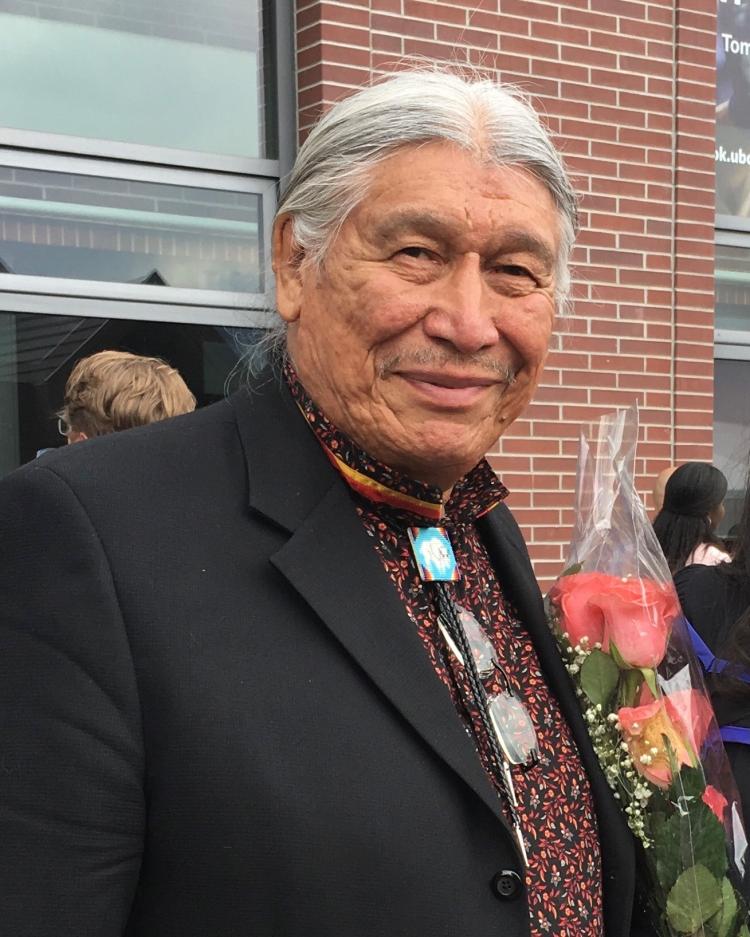A member of Smith's Landing First Nation and a former chief has been awarded an honorary degree by Kwantlen Polytechnic University (KPU).

Francois Paulette
Francois Paulette, an educator, activist and traditional knowledge keeper who dedicated his life to Indigenous rights and climate change advocacy, will receive an honorary doctor of laws during convocation ceremonies at KPU Surrey on Feb. 28.
"Francois Paulette is an example of tireless advocacy and relentless pursuit of justice, equity, and education for Indigenous Peoples and the defence of their rights," says Dr. Alan Davis, President and Vice-Chancellor at KPU. "His selfless contributions to his community, country and the world are truly remarkable and serve as an inspiration for us all and for the generations to come."
Paulette says he is honoured to receive the recognition.
"The moment I first heard about this award, I thought of the 16 Chiefs I stood with as we challenged the Canadian government," Paulette says. "This honour belongs to us all."
At the age of 21, Paulette, who is a survivor of the residential school system, became the youngest chief in the Northwest Territories. In 1973, together with 16 other chiefs, he challenged the Canadian government to recognize the Dene's title of more than one million square kilometres of land in the Northwest Territories and to prevent the construction of the Mackenzie Valley Pipeline. In 2023, the Dene National Assembly marked the 50th anniversary of the case ruling, which is now studied in post-secondary institutions across Canada.
"What I am most proud of in my advocacy work is the Paulette case and our efforts to get our ancestral lands back," he says. "We have a deep bond with the land and it is our responsibility to protect it and keep fighting for our rights and our lands."
Paulette has dedicated his life to advocating for Indigenous treaty rights and the advancement of the Denesuline language, culture and traditions. He was a founding member of the Dene Cultural Institute and one of the delegates who travelled to Geneva in 1977 to seek a seat in the United Nations and initiate the beginning of the discussions on the rights of Indigenous Peoples.
"We were already a developed nation when Europeans arrived," he says. "In the Denesuline language, we call it Dene Chanie our way of life, the way we maintain our identity, our connection to our ancestors and our relationship with the land. I want to spend time with my grandchildren on our lands and to pass on to them our traditions and knowledge. This way, our culture and bond with the Earth stay strong."
As a former member of the Assembly of First Nations Elder Council and an appointee to the Advisory Committee on Climate Action, Paulette played a crucial role in formulating the Elders' Statement on Climate Action and the Environment, influencing the Pan-Canadian Framework on Clean Growth and Climate Change.
Paulette says that protecting waters and lands from the destructive impact of fossil fuel companies is his lifelong mission.
In 2019, Paulette was named officer of the Order of Canada for his contributions to Indigenous treaty rights and for his advocacy of circumpolar health research.
He has one piece of advice to give to the graduating class of 2024.
"Don't get sidetracked and always return to your roots. Connect with your ancestral lands, as they are a source of strength and wisdom, and ensure you are giving back in return."













